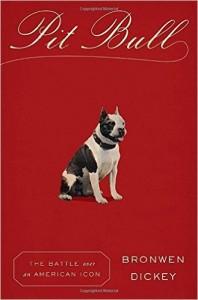Posted by Heidi K on Wednesday, Oct 12, 2016
Pit Bull advocate Bronwen Dickey’s summer 2016 book release Pit Bull: The Battle over an American Icon was sometimes very difficult to read. I even put off writing this blog post because I was too emotional after I first read the book to write a proper review! I have been a Pit Bull mama for almost a decade. Saysha is a 12-year-old female Staffordshire Terrier and Mowgli is a 3-year-old male American Bulldog mix. “Pit Bull” is not an exact breed – instead it has become a catch-all term for bulldogs of various kinds, or just mutts that look like Pits. Defining characteristics are blocky heads, thick muscular bodies, and big smiles. Saysha and Mowgli have very distinct personalities and looks. Mowgli weighs over 110 pounds; Saysha weighs only around 50 pounds. Mowgli loves eating fruit and veggies; Saysha will turn her nose up at a carrot or apple slice and instead beg for a biscuit. Saysha is very friendly with a princess streak, she naps a lot in her old age; Mowgli is playful and active yet more challenging, prone to becoming territorial about the house and barking out the front window. (Nothing a couple miles around the neighborhood can’t ease.) I can't imagine my life without them. One of my long-term plans is to own some land so I can start my own bulldog rescue here in Iowa.

(Above: Saysha and Mowgli in 2014. Mowgli is the white and grey dog.)
Through Bronwen’s well-researched book, I learned about the sheer quantity of Pits that are killed in shelters or removed from their families because of unscientific Breed Ban laws that vary across the United States. While many dogs are at risk of overbreeding, homelessness, and life in shelters, one of Bronwen’s main points is that we are prejudiced against Pit Bulls because we are prejudiced against the people who keep them. Assumptions about Pits and their people are everywhere. Why? Bronwen argues that Pits have been pegged as “low class” and “gangster” dogs. This was the most interesting part of the book to me, the claim that classist and racist assumptions held about people have over time transferred to the pets associated with them. The bulldog has a long history as not just a working dog breed, a farmhand and cart puller, but as a companion and protector of working class families in the United States. Bronwen’s research and thoughts around these points were well worth the read.
Bronwen also peels apart the many layers of dog bite misinformation with data. Pit bulls, after all, are far from the only dog breed capable of biting humans, and they are not the "most likely" type of dog to bite humans, either. Contrary to what certain news stories and prime-time specials have claimed, Pits do NOT have special locks in their jaws or "killer" genetics. There is no "aggressive DNA code” that permeates these dogs. Bronwen takes the media to task for its unfair portrayal of Pits. She also points to activist groups that work to educate the public about the real contexts and warning signs of dog aggression. If you love animals and want to learn more about Pit Bulls and their rich history, be sure not to miss this book!




Comments
I want to buy this book. From where I get in discount price?
Hi Patsy! We do have one copy available to check out for free here at Iowa City Public Library if you are in town. If not, try finding a copy used online maybe? Or wait until this title comes out in paperback in April.
Add new comment